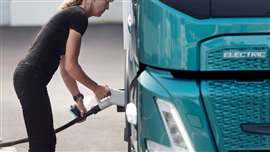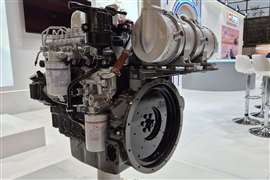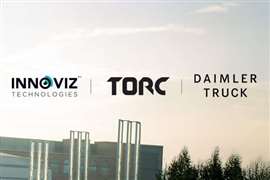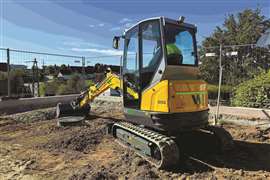Read this article in 中文 Français Deutsch Italiano Português Español
BSI releases new guidelines for heavy-duty truck charging stations
28 January 2025
 Volvo took part in development of new BSI truck charging standards (Photo: Volvo Trucks UK)
Volvo took part in development of new BSI truck charging standards (Photo: Volvo Trucks UK)
The British Standards Institution has published an updated second version of its guidelines covering standardisation of public heavy goods vehicle charging sites.
Funded by the UK Department for Transport, BSI Flex 2071 2.0 outlines a code of practise intended to ensure safe implementation of charging infrastructures at service areas and other rest stops.
As with other BSI material, the documentation is intended to standardise execution and practices to ensure user safety and ease of use. For example, consistency in design and signage is intended to support safe HGV manoeuvring.
Included are recommendations for charging site layouts and user access. There are also details covering how vehicles of different types should be separated; individual, specific charging bays are recommended for different purposes, such as overnight charging and rapid top up.
These are considered important for all stakeholders planning involvement with such sites, including logistics providers and power suppliers, through to OEMs delivering the vehicles.
It could also prove useful for those in risk management, which is important at sites where multiple fuel types are being delivered.
In the UK, current policy will see the phasing out of non zero-emission trucks less than 26 tonnes by 2035. All new trucks from 2040 are expected to be zero-emission models, regardless of weight. It is put forward that by 2050, the UK HGV fleet will be largely zero-emission vehicles.
It is hoped that documentation such as this will drive the standardisation most elements of eHGV charging stations across Europe (including the Charging Interface Initiative), facilitating a trans-continental network to support battery-powered transport.
A series of companies and groups took part in production of the material, including the Road Haulage Association, Institution of Engineering and Technology, Eddie Stobart and Volvo.
Further details on development of truck recharging networks across Europe can be found in the Alternative Fuel Infrastructure Regulation (AFIR). This outlines plans for a European network which, in addition to other features, will see a charging station made available every 120 km across Europe’s main highways.
POWER SOURCING GUIDE
The trusted reference and buyer’s guide for 83 years
The original “desktop search engine,” guiding nearly 10,000 users in more than 90 countries it is the primary reference for specifications and details on all the components that go into engine systems.
Visit Now
STAY CONNECTED




Receive the information you need when you need it through our world-leading magazines, newsletters and daily briefings.
CONNECT WITH THE TEAM













